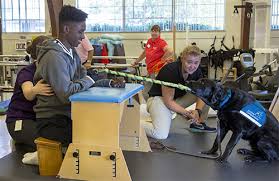Therapy Dog Training Programs: Enhancing Lives One Paw at a Time
Therapy dogs play a vital role in providing comfort, support, and companionship to individuals in need. Whether visiting hospitals, schools, nursing homes, or disaster areas, these furry heroes have a unique ability to brighten the day of those they encounter.
Therapy dog training programs are designed to prepare dogs for this important role in society. These programs focus on developing the necessary skills and temperament required for dogs to interact safely and effectively with people in various settings.
One key aspect of therapy dog training is socialisation. Dogs are exposed to different environments, sounds, smells, and people to ensure they remain calm and composed in any situation. They learn how to interact politely with strangers and provide comfort without being intrusive.
Additionally, therapy dog training emphasises obedience and basic commands such as sit, stay, come, and leave it. These skills are essential for maintaining control over the dog in potentially challenging situations and ensuring the safety of both the dog and those they interact with.
Furthermore, therapy dog training programs focus on assessing the dog’s temperament and suitability for therapy work. Not all dogs are suited to this role, as it requires a special combination of traits such as friendliness, patience, empathy, and adaptability.
Ultimately, therapy dog training programs aim to create well-rounded canine companions who can bring joy and comfort to those in need. Through proper training and guidance, these dogs become ambassadors of love and healing in their communities.
If you are interested in enrolling your dog in a therapy dog training program or becoming a certified therapy dog handler yourself, reach out to reputable organisations or trainers who specialise in this field. Together, we can continue to enhance lives one paw at a time through the power of therapy dogs.
Top 5 Tips for Selecting and Succeeding in Therapy Dog Training Programmes
- Choose a reputable therapy dog training program that is recognised by relevant organisations.
- Ensure the training program focuses on obedience, socialisation, and specific therapy dog skills.
- Consistency and positive reinforcement are key in therapy dog training programs.
- Expose your dog to various environments, people, and situations to build their confidence and adaptability.
- Regular practice sessions at home are essential to reinforce learning and strengthen the bond between you and your therapy dog.
Choose a reputable therapy dog training program that is recognised by relevant organisations.
When embarking on the journey of training your dog to become a therapy companion, it is crucial to select a reputable therapy dog training program that holds recognition from relevant organisations. Opting for a recognised program ensures that your dog receives quality training that aligns with industry standards and best practices. By choosing a reputable training provider, you can have confidence in the legitimacy and effectiveness of the program, setting your canine companion up for success in their future role as a therapy dog.
Ensure the training program focuses on obedience, socialisation, and specific therapy dog skills.
To maximise the effectiveness of therapy dog training programs, it is crucial to ensure that the curriculum encompasses key elements such as obedience training, socialisation exercises, and specialised therapy dog skills. Obedience training lays the foundation for a well-behaved and responsive dog, enabling them to follow commands reliably in various environments. Socialisation helps dogs acclimate to different situations and interact positively with people of all ages and backgrounds. Specific therapy dog skills, such as providing comfort without being overly intrusive, are essential for fostering meaningful connections with individuals in need. By prioritising these aspects in the training process, therapy dogs can fulfil their role as compassionate companions who bring comfort and joy to those they encounter.
Consistency and positive reinforcement are key in therapy dog training programs.
Consistency and positive reinforcement are fundamental principles in therapy dog training programs. By maintaining a consistent training routine and using positive reinforcement techniques, handlers can effectively communicate with their dogs and reinforce desired behaviours. Dogs thrive on clear expectations and rewards for good behaviour, making it essential to provide them with a structured environment where they can learn and succeed. Through consistent training practices and positive reinforcement, therapy dogs can develop the skills and temperament needed to excel in their role as compassionate companions.
Expose your dog to various environments, people, and situations to build their confidence and adaptability.
To enhance your dog’s readiness for therapy work, it is crucial to expose them to diverse environments, people, and situations. By providing these varied experiences, you can help build your dog’s confidence and adaptability, preparing them to interact positively and calmly with individuals in need. This exposure not only strengthens their social skills but also fosters a sense of security and ease in unfamiliar settings, ultimately contributing to their effectiveness as a therapy dog.
Regular practice sessions at home are essential to reinforce learning and strengthen the bond between you and your therapy dog.
Regular practice sessions at home are crucial in therapy dog training programs as they help reinforce learning and deepen the bond between you and your therapy dog. Consistent practice of commands, socialisation exercises, and positive reinforcement techniques in familiar surroundings can enhance your dog’s skills and confidence, preparing them for successful interactions in various therapy settings. These practice sessions also provide valuable one-on-one time for you and your furry companion to strengthen your connection and mutual trust, laying a solid foundation for a fulfilling partnership in the noble work of therapy dog service.

